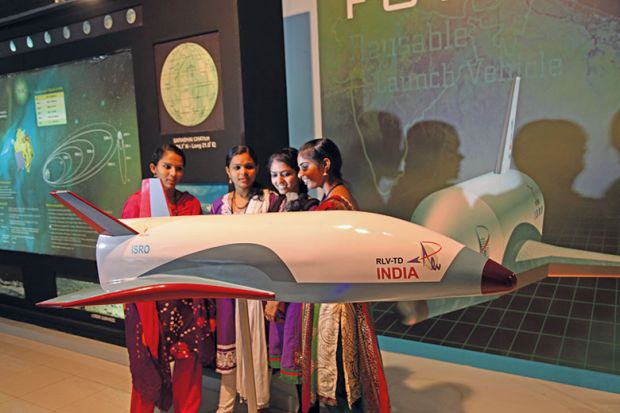Universities in India should introduce a charter mark for gender equality that originated in the UK to help boost the number of women working in science, technology, engineering, mathematics and medicine, according to a new report.
The recommendation, in a report co-authored by the Indian National Science Academy, comes after a meeting late last year in Delhi that addressed the lack of women working in the so-called STEMM subjects.
The Athena SWAN Charter for Women in Science is designed to promote employment practices that support women working in higher education and research. The charter, which is run by the UK’s Equality Challenge Unit, bestows bronze, silver and gold awards on institutions and departments that demonstrate increasing levels of good practice in recruiting, retaining and promoting women.
The initiative was started in 2005 to address the issue of women’s under-representation in STEMM at UK universities. Since then, it has grown to include research institutes, introduced a charter mark for the arts, humanities and social sciences and spread to the Republic of Ireland and Australia.
India could be the next country to adopt the initiative, following an event that focused on developing practical plans to develop the career paths for women working in STEMM in India. The meeting brought together Indian government officials, university staff and delegates from national academies and societies in the UK, India and Australia.
The meeting report, Summary Report: Women in STEMM India Workshop, says that data on the number of women working in STEMM in India are limited. But it cites several reasons why so few women work in these areas, which include a lack of parental support for girls who might consider such careers, poor interactions with maths and science teachers in schools, women’s lack of confidence about entering the field and, later in life, taking career breaks for family duties.
For those women who do enter employment in a STEMM field, it appears that their opportunities dwindle as they progress up the career ladder. A survey of 2,000 women about their reasons for leaving science, conducted by the Indian National Science Academy, found that two-thirds dropped out because they could not find jobs commensurate with their experience, according to the report.
The report’s first recommendation is to develop a proposal to transport the Athena SWAN framework to India for presentation to the Indian Science Academies’ inter-academy panel.
Ruth Gilligan, Athena SWAN manager at the Equality Challenge Unit, said that the advancement of gender equality for all is “at the heart” of the charter. “Therefore I am pleased to see a commitment to promote and increase the participation and progression of women in STEMM careers by proposing the introduction of an Athena SWAN framework in India,” she said.
“The ECU looks forward to partnering with the Indian Science Academies’ inter-academy panel to develop this proposal.”
The report also recommends that common data sources about STEMM and gender be identified in India, Australia and the UK so that the issue can be reported uniformly and systematically.
Register to continue
Why register?
- Registration is free and only takes a moment
- Once registered, you can read 3 articles a month
- Sign up for our newsletter
Subscribe
Or subscribe for unlimited access to:
- Unlimited access to news, views, insights & reviews
- Digital editions
- Digital access to THE’s university and college rankings analysis
Already registered or a current subscriber? Login








